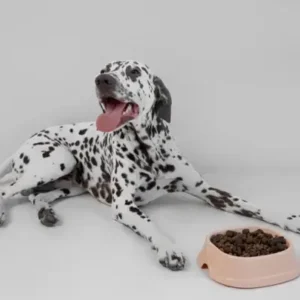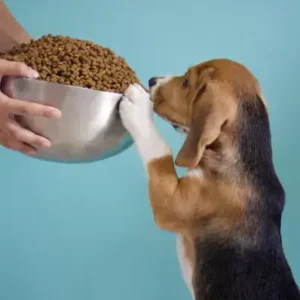Chocolate
Chocolate contains theobromine and caffeine, both of which are toxic to dogs. Even small amounts can lead to vomiting, diarrhea, increased heart rate, and seizures. Dark and baking chocolate are especially dangerous due to their high theobromine content.
Grapes & Raisins
Grapes and raisins can cause sudden kidney failure in dogs, even in small amounts. Symptoms include lethargy, vomiting, and loss of appetite. If your dog ingests grapes or raisins, contact a veterinarian immediately.
Onions & Garlic
Onions, garlic, leeks, and chives contain compounds that damage red blood cells, leading to anemia. Cooked, raw, or powdered forms can all be harmful, so avoid giving your dog any foods seasoned with these ingredients.
Xylitol (Artificial Sweetener)
Xylitol, commonly found in sugar-free gum, candy, and baked goods, causes a dangerous insulin spike in dogs. This can lead to hypoglycemia (low blood sugar), seizures, and even liver failure.
Alcohol
Alcohol affects dogs much more severely than humans, leading to vomiting, difficulty breathing, coma, or even death. Never give your dog alcohol in any form, including beer, wine, or food cooked with alcohol.
Caffeine (Coffee & Tea)
Caffeine is a stimulant that can cause a rapid heart rate, tremors, restlessness, and seizures in dogs. Be sure to keep coffee grounds, tea bags, and energy drinks out of your dog’s reach.
Macadamia Nuts
Even a few macadamia nuts can cause weakness, vomiting, tremors, and hyperthermia in dogs. These symptoms may appear within 12 hours of ingestion and last up to 48 hours.
Avocados
Avocados contain persin, a toxin that can cause vomiting and diarrhea in dogs. While small amounts of avocado flesh may not be lethal, the pit is a choking hazard and can cause intestinal blockages.
Raw Dough & Yeast
Raw dough expands in a dog’s stomach, causing bloating and discomfort. Additionally, yeast fermentation can produce alcohol, which can lead to alcohol poisoning.
Other Potentially Harmful Foods
While the following foods may not be immediately toxic, they can still pose health risks:
- Dairy Products – Many dogs are lactose intolerant, leading to digestive upset.
- Fatty & Fried Foods – Can cause pancreatitis, a painful and potentially life-threatening condition.
- Cooked Bones – Splinter easily and may cause choking or internal injuries.
- Salty Snacks – Excess salt can lead to sodium ion poisoning, causing vomiting, tremors, and seizures.
Signs of Food Poisoning in Dogs
If your dog consumes a toxic food, watch for these symptoms:
- Vomiting & Diarrhea
- Lethargy & Weakness
- Excessive Drooling
- Tremors or Seizures
- Rapid Heartbeat
- Loss of Appetite
If you notice any of these signs, contact your veterinarian immediately.
What to Do If Your Dog Eats Toxic Food
After understanding the dangers of toxic foods for dogs, it’s crucial to know what steps to take if your dog ingests something harmful.
Here’s what you should do immediately:
Remove the Food
If you catch your dog in the act, remove any remaining food and check how much was consumed.
Monitor Symptoms
Even if your dog seems fine, symptoms can appear hours later. Keep a close eye on their behavior.
Contact a Veterinarian
For highly toxic foods like chocolate, grapes, or xylitol, call your vet or an emergency pet poison hotline immediately.
Do NOT Induce Vomiting Without Vet Guidance
In some cases, inducing vomiting can cause more harm. Only do so if advised by a professional.
Safe Alternatives & Healthy Treats for Dogs
Instead of toxic foods, offer your dog these safe and healthy alternatives:
- Fruits: Blueberries, apples (without seeds), bananas
- Vegetables: Carrots, cucumbers, green beans
- Protein: Cooked chicken, salmon, or plain scrambled eggs
- Dog-Specific Treats: Always choose treats formulated for canine health








